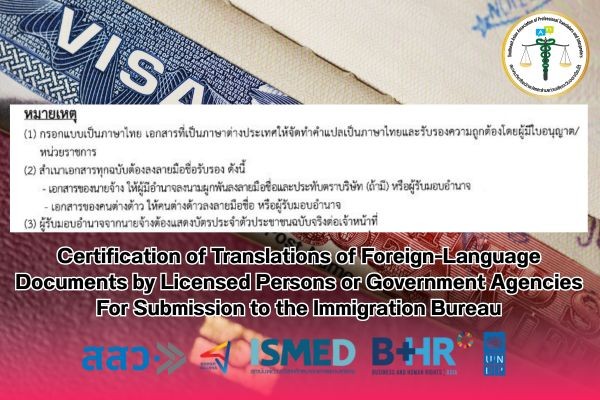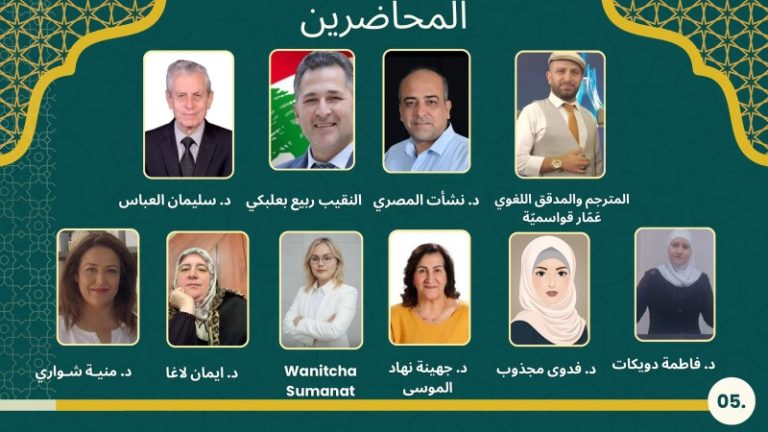Certification of Translations of Foreign-Language Documents by Licensed Persons or Government Agencies
For Submission to the Immigration Bureau in Thailand
10 August 2025, Bangkok – Submitting a visa application to the Immigration Bureau of Thailand requires various supporting documents, many of which are often in foreign languages. The translation and certification of these documents are crucial steps to ensure their legal validity. This article analyzes the Immigration Bureau’s requirements for having translations certified by “licensed persons” or “government agencies,” drawing upon laws, administrative practices, and professional standards. It aims to provide a clear understanding and guidance for both applicants and experienced translators.
Remarks
(1) Complete the form in Thai. Any document in a foreign language must be translated into Thai, and the translation must be certified for accuracy by a licensed person or a government agency.
(2) A certified true copy of every document must bear a signature as follows:
- For corporate documents: The authorized signatory must sign and affix the company seal (if any), or the authorized representative must sign.
- For personal documents, the document owner must sign, or the authorized representative must sign.
(3) Any authorized representative appearing in person must present their national identification card to the officer.
1. Introduction
The Immigration Bureau (IB) requires that foreign-language documents submitted in support of visa applications be translated into Thai, and such translations must be certified as accurate by a “licensed person” or a “government agency” (Immigration Bureau, 2023).
This requirement is designed to safeguard the accuracy of document content and to minimize the risk of forged or distorted information.
2. Licensed Persons
In the context of translation certification, “licensed persons” refers to individuals engaged in the translation profession or other regulated professions authorized by the state to certify documents, such as:
- Translators certified by professional associations whose names appear on lists recognized by government agencies, e.g., Certified Translators of the Southeast Asian Association of Professional Translators and Interpreters (SEAProTI).
Using a licensed person assures the Immigration Bureau that the translation is accurate and that the certifier can be verified under the law (Pym, 2010).
3. Government Agencies
Alternatively, “government agencies” refers to state bodies authorized to issue or certify translated documents, such as:
- Department of Consular Affairs, Ministry of Foreign Affairs (Nationality and Legalization Division)
- Royal Thai Embassies or Consulates-General abroad
- State agencies directly related to the document in question, such as the Ministry of Education or the Department of Business Development
Certification by a government agency often grants the translation a clearer “legal status” in the eyes of the Immigration Bureau and other agencies (Kelly, 2018).
4. Rationale for the Requirement
The mandate to use licensed persons or government agencies to certify translations serves three main purposes:
- Prevent forgery or content distortion – Licensed persons or government agencies can be easily verified.
- Raise translation quality standards – Licensed persons generally have expertise in both language and law.
- Enhance credibility in visa processing – Immigration officers can rely on the translations without re-verifying every word.
5. Recommended Practices
- Applicants should verify that the translator holds a license and is listed in a registry recognized by government agencies.
- If using a government agency, contact the body with direct authority over the document to ensure the certification carries the greatest weight.
- Keep proof of certification, such as stamped receipts and copies of the translator’s or official’s ID.
6. Conclusion
The Immigration Bureau’s requirement for translations to be certified by licensed persons or government agencies is grounded in legal and professional reasoning. Complying with these requirements not only increases the likelihood of visa approval but also helps maintain the standards and credibility of the immigration system.
References
- Kelly, N. (2018). The importance of certified translations in legal and immigration contexts. Multilingual, 29(6), 28–31.
- Pym, A. (2010). Exploring translation theories (2nd ed.). Routledge.
- Immigration Bureau. (2023). Regulations and requirements for visa extension and visa application. Bangkok: Immigration Bureau.
About Certified Translators, Translation Certification Providers, and Certified Interpreters of the Southeast Asian Association of Professional Translators and Interpreters (SEAProTI)
The Southeast Asian Association of Professional Translators and Interpreters (SEAProTI) has established criteria and qualifications for those registered as “Certified Translators,” “Translation Certification Providers,” and “Certified Interpreters” of the Association, as stipulated in Sections 9 and 10 in the Royal Gazette of the Secretariat of the Cabinet, Office of the Prime Minister of the Kingdom of Thailand, dated 25 July 2024, Volume 141, Part 66 Ng, page 100. Full text available at: The Royal Thai Government Gazette
การรับรองคำแปลเอกสารภาษาต่างประเทศโดยผู้มีใบอนุญาตหรือหน่วยราชการ
สำหรับการยื่นขอวีซ่าต่อสำนักงานตรวจคนเข้าเมือง
10 สิงหาคม 2568, กรุงเทพมหานคร – การยื่นคำขอวีซ่าต่อสำนักงานตรวจคนเข้าเมืองของประเทศไทยจำเป็นต้องใช้เอกสารประกอบหลายประเภท บ่อยครั้งเอกสารเหล่านี้เป็นภาษาต่างประเทศ การแปลและการรับรองความถูกต้องของคำแปลจึงเป็นขั้นตอนสำคัญเพื่อให้เอกสารมีผลตามกฎหมาย บทความนี้วิเคราะห์ข้อกำหนดของสำนักงานตรวจคนเข้าเมืองเกี่ยวกับการใช้ผู้มีใบอนุญาตหรือหน่วยราชการในการรับรองคำแปล โดยพิจารณาจากกฎหมาย ระเบียบปฏิบัติ และมาตรฐานวิชาชีพ เพื่อสร้างความเข้าใจและแนวทางที่ถูกต้องแก่ผู้ยื่นคำขอและผู้ประกอบวิชาชีพการแปล
ข้อกำหนดของ ตม.
หมายเหตุ
(1) กรอกแบบเป็นภาษาไทย เอกสารที่เป็นภาษาต่างประเทศให้จัดทำคำแปลเป็นภาษาไทยและรับรองความถูกต้องโดยผู้มีใบอนุญาต/หน่วยราชการ
(2) สำเนาเอกสารทุกฉบับต้องลงลายมือชื่อรับรอง ดังนี้
- เอกสารของนิติบุคคล ให้ผู้มีอำนาจลงนามผูกพันลงลายมือชื่อและประทับตราบริษัท (ถ้ามี) หรือผู้รับมอบอำนาจ
- เอกสารของบุคคลทั่วไป ให้บุคคลเจ้าของเอกสารลงลายมือชื่อ หรือผู้รับมอบอำนาจ
(3) ผู้รับมอบอำนาจทางการเข้าต้องแสดงบัตรประจำตัวประชาชนต่อเจ้าหน้าที่
1. บทนำ
สำนักงานตรวจคนเข้าเมือง (ตม.) กำหนดให้เอกสารภาษาต่างประเทศที่ใช้ประกอบการยื่นคำขอวีซ่าต้องจัดทำคำแปลเป็นภาษาไทย และคำแปลนั้นต้องได้รับการรับรองความถูกต้องโดย “ผู้มีใบอนุญาต” หรือ “หน่วยราชการ” (สำนักงานตรวจคนเข้าเมือง, 2566)
ข้อกำหนดนี้มุ่งคุ้มครองความถูกต้องของเนื้อหาในเอกสารและลดความเสี่ยงในการใช้เอกสารปลอมหรือบิดเบือนข้อมูล
2. ผู้มีใบอนุญาต (Licensed Person)
คำว่า “ผู้มีใบอนุญาต” ในบริบทของการรับรองคำแปล หมายถึงผู้ประกอบวิชาชีพการแปลหรือวิชาชีพที่มีกฎหมายรองรับและได้รับอนุญาตจากรัฐให้ดำเนินการรับรองเอกสาร เช่น
- ผู้แปลที่ได้รับการรับรองจากสมาคมวิชาชีพ ซึ่งอยู่ในบัญชีรายชื่อที่หน่วยงานรัฐยอมรับ เช่น Certified Translator ของสมาคมวิชาชีพนักแปลและล่ามแห่งเอเชียตะวันออกเฉียงใต้ (SEAProTI)
การใช้ผู้มีใบอนุญาตช่วยให้สำนักงานตรวจคนเข้าเมืองมั่นใจได้ว่าคำแปลมีความถูกต้องและสามารถตรวจสอบตัวบุคคลผู้รับรองได้ตามกฎหมาย (Pym, 2010)
3. หน่วยราชการ (Government Agencies)
ในอีกทางหนึ่ง “หน่วยราชการ” หมายถึงหน่วยงานของรัฐที่มีอำนาจออกหรือรับรองเอกสารแปล เช่น
- กรมการกงสุล กระทรวงการต่างประเทศ (กองสัญชาติและนิติกรณ์)
- สถานเอกอัครราชทูตไทย หรือ สถานกงสุลใหญ่ ในต่างประเทศ
- หน่วยงานของรัฐที่เกี่ยวข้องกับเอกสารนั้นโดยตรง เช่น กระทรวงศึกษาธิการ กรมพัฒนาธุรกิจการค้า เป็นต้น
การรับรองโดยหน่วยราชการมักเป็นขั้นตอนที่ทำให้คำแปลมี “สถานะทางกฎหมาย” ที่ชัดเจนยิ่งขึ้นในสายตาของ ตม. และหน่วยงานอื่น (Kelly, 2018)
4. เหตุผลของข้อกำหนด
การกำหนดให้ใช้ผู้มีใบอนุญาตหรือหน่วยราชการรับรองคำแปลมีวัตถุประสงค์หลัก 3 ประการ คือ
- ป้องกันการปลอมแปลงหรือบิดเบือนเนื้อหา – การใช้ผู้มีใบอนุญาตหรือหน่วยงานรัฐทำให้ตรวจสอบความถูกต้องได้ง่าย
- ยกระดับมาตรฐานคำแปล – ผู้มีใบอนุญาตมักมีความรู้ทั้งด้านภาษาและกฎหมาย
- เพิ่มความน่าเชื่อถือในกระบวนการพิจารณาวีซ่า – เจ้าหน้าที่ตรวจคนเข้าเมืองสามารถใช้คำแปลเป็นหลักฐานได้โดยไม่ต้องตรวจสอบซ้ำทุกคำ
5. แนวปฏิบัติที่แนะนำ
- ผู้ยื่นคำขอควรตรวจสอบว่าผู้แปลมีใบอนุญาตและอยู่ในทะเบียนที่หน่วยงานรัฐยอมรับ
- หากใช้หน่วยราชการ ควรติดต่อหน่วยงานที่มีอำนาจโดยตรงกับเอกสารนั้นเพื่อให้การรับรองมีน้ำหนักมากที่สุด
- เก็บหลักฐานการรับรอง เช่น ใบเสร็จตราประทับและสำเนาบัตรของผู้แปล/เจ้าหน้าที่รัฐ
6. บทสรุป
ข้อกำหนดของสำนักงานตรวจคนเข้าเมืองในการให้ผู้มีใบอนุญาตหรือหน่วยราชการรับรองคำแปลเอกสารภาษาต่างประเทศ เป็นมาตรการที่มีเหตุผลทางกฎหมายและวิชาชีพ การปฏิบัติตามข้อกำหนดนี้ไม่เพียงเพิ่มโอกาสในการได้รับอนุมัติวีซ่า แต่ยังเป็นการรักษามาตรฐานและความน่าเชื่อถือของระบบการตรวจคนเข้าเมือง
เอกสารอ้างอิง
- Kelly, N. (2018). The importance of certified translations in legal and immigration contexts. Multilingual, 29(6), 28–31.
- Pym, A. (2010). Exploring translation theories (2nd ed.). Routledge.
- สำนักงานตรวจคนเข้าเมือง. (2566). ระเบียบและข้อกำหนดเกี่ยวกับการยื่นคำขออยู่ต่อและขอวีซ่า. กรุงเทพฯ: สำนักงานตรวจคนเข้าเมือง.
เกี่ยวกับนักแปลรับรอง ผู้รับรองการแปล และล่ามรับรองของสมาคมวิชาชีพนักแปลและล่ามแห่งเอเชียตะวันออกเฉียงใต้
สมาคมวิชาชีพนักแปลและล่ามแห่งเอเชียตะวันออกเฉียงใต้ (SEAProTI) ได้ประกาศหลักเกณฑ์และคุณสมบัติผู้ที่ขึ้นทะเบียนเป็น “นักแปลรับรอง (Certified Translators) และผู้รับรองการแปล (Translation Certification Providers) และล่ามรับรอง (Certified Interpreters)” ของสมาคม หมวดที่ 9 และหมวดที่ 10 ในราชกิจจานุเบกษา ของสำนักเลขาธิการคณะรัฐมนตรี ในสำนักนายกรัฐมนตรี แห่งราชอาณาจักรไทย ลงวันที่ 25 ก.ค. 2567 เล่มที่ 141 ตอนที่ 66 ง หน้า 100 อ่านฉบับเต็มได้ที่: นักแปลรับรอง ผู้รับรองการแปล และล่ามรับรอง

























